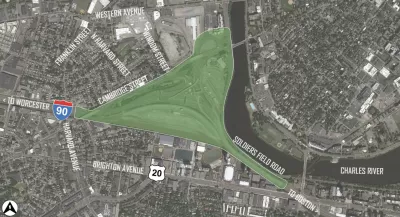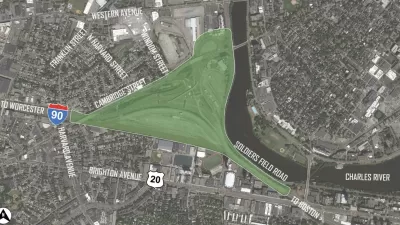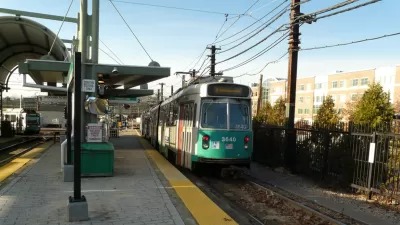The city of Boston and Massachusetts Department of Transportation have applied to a $5 billion federal grant program aimed at ‘unusually large and complex projects.’

“On Tuesday, Mayor Michelle Wu and MassDOT submitted a grant application to Washington in hopes of winning $1.2 billion to build the Allston Multimodal Project, a massive reconfiguration of Interstate 90, Soldiers Field Road, and the Framingham/Worcester railroad line on 90 acres of land along the Charles River waterfront in Allston.” As Christiman MilNeil reports for Streetsblog Mass, the federal funding would match $754 million already committed by the city and state for the project.
According to the article, “the grant application promises that the new grid of streets that would create several new city blocks between the MBTA tracks and the riverfront will be built in accordance with the city’s and the state’s ‘complete streets’ design guidelines, with ‘extensive bicycle and pedestrian infrastructure.’” Despite this, “the latest conceptual sketches of the project still show that many of those streets will be unusually wide by Boston’s standards, with five or more lanes for motor vehicle traffic.”
MilNeil writes that “A statement from the mayor’s office also hints that the city will be looking for significant affordable housing commitments from the private development that’s expected to occur on those new city blocks, which are owned by Harvard University.” In a press statement, Boston Mayor Michelle said that “By prioritizing access to the riverfront, public transit routes, and added space for affordable housing, we can ensure we’re making the right decisions for future generations of Boston residents and visitors.”
Environmental impact reviews for the project, expected to be completed by the end of 2021, will likely not be ready until 2025. If the federal funding is approved, “Construction could then begin in the fall of that year, and last 7 years to complete the project by fall 2032.”
FULL STORY: Boston, MassDOT Seek ‘Mega’ Cash to Build Allston/I-90 Project

Alabama: Trump Terminates Settlements for Black Communities Harmed By Raw Sewage
Trump deemed the landmark civil rights agreement “illegal DEI and environmental justice policy.”

Planetizen Federal Action Tracker
A weekly monitor of how Trump’s orders and actions are impacting planners and planning in America.

Why Should We Subsidize Public Transportation?
Many public transit agencies face financial stress due to rising costs, declining fare revenue, and declining subsidies. Transit advocates must provide a strong business case for increasing public transit funding.

Understanding Road Diets
An explainer from Momentum highlights the advantages of reducing vehicle lanes in favor of more bike, transit, and pedestrian infrastructure.

New California Law Regulates Warehouse Pollution
A new law tightens building and emissions regulations for large distribution warehouses to mitigate air pollution and traffic in surrounding communities.

Phoenix Announces Opening Date for Light Rail Extension
The South Central extension will connect South Phoenix to downtown and other major hubs starting on June 7.
Urban Design for Planners 1: Software Tools
This six-course series explores essential urban design concepts using open source software and equips planners with the tools they need to participate fully in the urban design process.
Planning for Universal Design
Learn the tools for implementing Universal Design in planning regulations.
Caltrans
Smith Gee Studio
Institute for Housing and Urban Development Studies (IHS)
City of Grandview
Harvard GSD Executive Education
Toledo-Lucas County Plan Commissions
Salt Lake City
NYU Wagner Graduate School of Public Service




























